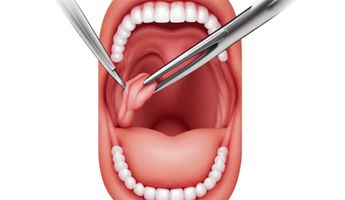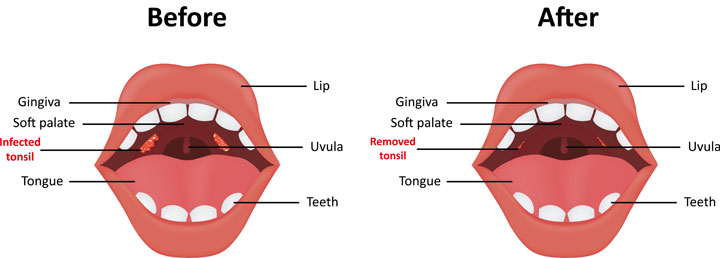Tonsillectomy in Taipei
Search and Compare the Best Clinics and Doctors at the Lowest Prices for Tonsillectomy in Taipei

Find the best clinics for Tonsillectomy in Taipei
No pricing info available
Morocco offers the best prices Worldwide
Price: $ 308
From 128 verified reviews
ashley kauffman, 21 September 2020
At NTU hospital they are constantly processing high volumes of patients efficiently and with a happy attitude. I was in and out for my follow-up in less than 30 mins. Moreover, my previous recent experience in the ER department was very positive. All of the doctors and many of the staff can speak English. What’s more, they offer online appointment booking in English. The best place in Taiwan to go for any serious health concerns. The attitude of the staff is impressive considering how busy it gets.
From 136 verified reviews
Nana Hong, 18 September 2020
皮膚科彭家盈醫師問診親切仔細,五顆星是給她的
WHY US?
At Medijump, we're making medical easy. You can search, compare, discuss, and book your medical all in one place. We open the door to the best medical providers worldwide, saving you time and energy along the way, and it's all for FREE, no hidden fees, and no price markups guaranteed. So what are you waiting for?

Free

Best Price

Widest Selection

Risk-Free
What you need to know about Tonsillectomy in Taipei

Tonsillectomy is a surgical procedure to remove the tonsils – the two oval-shaped pads of tissue located at the back of the throat. The procedure is usually performed to treat recurring or chronic inflammation and infection of the tonsils (known as tonsillitis), but it can also be done to treat breathing problems related to swollen tonsils, sleep apnea, cancer of the tonsils, bleeding of the tonsils, as well as frequent and loud snoring.
What does a Tonsillectomy Procedure Involve?
Tonsillectomy is performed under general anesthetic, so you will not feel any pain during the surgery. There are two ways to perform a tonsillectomy. The most common way is to use a blade or scalpel to cut out the tonsils. The other way is to use a specialized surgical tool that uses soundwaves, or high-powered energy heat to destroy or remove the tissues and stop any bleeding.
How Long Should I Stay in Taipei for a Tonsillectomy Procedure?
Unless there is a complication that occurs after the surgery, you should be able to leave the hospital on the same day. However, plan to stay in Taipei for about 5 to 10 days for initial recovery and follow-up hospital checkups as your surgeon will monitor the healing progress.
What's the Recovery Time for Tonsillectomy Procedures in Taipei?
The total recovery period can take about two weeks, but most people are able to go back to work or school and resume most of their normal routine within 5-7 days. Avoid any strenuous activities, such as intense exercise and heavy lifting for a few weeks following the surgery to avoid any complications. Your surgeon will give you a detailed recovery timeline for you.
What sort of Aftercare is Required for Tonsillectomy Procedures in Taipei?
Make sure to take pain medications as prescribed by your surgeon and drink plenty of water to avoid dehydration. You may need to avoid hard, crunchy, acidic, or spicy foods for a while, and your surgeon may give you a dietary plan. Talk to your surgeon about any activities that you need to avoid to prevent tonsillitis from recurring.
What's the Success Rate of Tonsillectomy Procedures in Taipei?
Tonsillectomy is generally safe and highly successful. The morbidity rates of the procedure range from 1.5% to 1.4%. However, like other types of surgeries, there are side effects and risks that you should not overlook, including swelling, bleeding during healing, bleeding during surgery, reactions to anesthetics, infection, and sore throat.
Are there Alternatives to Tonsillectomy Procedures in Taipei?
In some cases, tonsillitis that is not severe and only happened once does not need a tonsillectomy. For other conditions, your alternative depends on the disease you used the procedure for. For instance, if you have sleep apnea, your doctor may suggest you undergo nasal surgery, tongue surgery, or bone surgery. If you need to undergo the procedure because of cancer, your doctor may recommend chemotherapy, immunotherapy, and radiation therapy.
What Should You Expect Before and After the Procedure
Having a problem in your tonsils can be uncomfortable, causes painful symptoms, and it can also lead to other dangerous complications. After the procedure, all of your symptoms should be relieved and your risk of dangerous complications is significantly reduced.
Whilst the information presented here has been accurately sourced and verified by a medical professional for its accuracy, it is still advised to consult with your doctor before pursuing a medical treatment at one of the listed medical providers
No Time?
Tell us what you're looking for and we'll reachout to the top clinics all at once
Enquire Now

Popular Procedures in Taipei
Prices Start From $8,031

Prices Start From $404

Prices Start From $18

Recommended Medical Centers in Taipei for Tonsillectomy

- Interpreter services
- Translation service
- Religious facilities
- Medical records transfer
- Medical travel insurance
- Health insurance coordination
- TV in the room
- Safe in the room
- Phone in the room
- Private rooms for patients available

- Interpreter services
- Translation service
- Religious facilities
- Medical records transfer
- Medical travel insurance
- Health insurance coordination
- TV in the room
- Safe in the room
- Phone in the room
- Private rooms for patients available

- Interpreter services
- Translation service
- Religious facilities
- Medical records transfer
- Medical travel insurance
- Health insurance coordination
- TV in the room
- Safe in the room
- Phone in the room
- Private rooms for patients available

- Interpreter services
- Translation service
- Religious facilities
- Medical records transfer
- Medical travel insurance
- Health insurance coordination
- TV in the room
- Safe in the room
- Phone in the room
- Private rooms for patients available

- Interpreter services
- Translation service
- Religious facilities
- Medical records transfer
- Medical travel insurance
- Health insurance coordination
- TV in the room
- Safe in the room
- Phone in the room
- Private rooms for patients available

- Interpreter services
- Translation service
- Religious facilities
- Medical records transfer
- Medical travel insurance
- Health insurance coordination
- TV in the room
- Safe in the room
- Phone in the room
- Private rooms for patients available

- Interpreter services
- Translation service
- Religious facilities
- Medical records transfer
- Medical travel insurance
- Health insurance coordination
- TV in the room
- Safe in the room
- Phone in the room
- Private rooms for patients available

- Interpreter services
- Translation service
- Religious facilities
- Medical records transfer
- Medical travel insurance
- Health insurance coordination
- TV in the room
- Safe in the room
- Phone in the room
- Private rooms for patients available

- Interpreter services
- Translation service
- Religious facilities
- Medical records transfer
- Medical travel insurance
- Health insurance coordination
- TV in the room
- Safe in the room
- Phone in the room
- Private rooms for patients available

- Interpreter services
- Translation service
- Religious facilities
- Medical records transfer
- Medical travel insurance
- Health insurance coordination
- TV in the room
- Safe in the room
- Phone in the room
- Private rooms for patients available
Tonsillectomy in and around Taipei
About Taipei
Taipei City is the capital and one of the special municipalities of Taiwan. It is located in the northern part of the island in a basin between the Central Mountains and the Yangming Mountains. Characterized by friendly people and safe streets, this city is one of the most fascinating places to visit. It has an amazing history, delicious food, and a blend of Chinese culture with a fusion of Japanese, American, and Southeast Asian influences. While most visitors normally visit the city to indulge in its culture and go sightseeing, more and more people are traveling here to have medical treatment, due to the high-quality medical standards, professional teams, high-tech medical equipment, and reasonable prices.
Popular Parts of Taipei
Zhongshan and Datong are two of the most popular parts of Taipei. Zhongshan was once the financial and international business center of the city, and today, it still has plenty of hotels and eateries. Visitors can also find numerous excellent museums, Taipei Expo Park, and Taipei’s version of the London Eye called Miramar. Datong is one of the oldest parts of the city. It is known to be home to Taipei’s finest temples, such as the Confucius Temple, Bao’an Temple, and Xiahai City God Temple. Those who love shopping should go to Da’an, an important commercial and residential area in the city. It houses some of the city’s classiest shopping areas, as well as the most sophisticated bars and a beautiful park. Another popular area is Shilin, which is where the National Palace Museum is located.
Transport in Taipei
The primary international airport in Taipei is the Taiwan Taoyuan International Airport. It connects the city with various major cities around the globe, such as New York, Frankfurt, Tokyo, and Paris. Some budget airlines are operating from this airport, including AirAsia and Eastar Jet. To journey around, Taipei there is a very efficient, safe, and clean Mass Rapid Transit (MRT) system, which is called Metro Taipei. It has an extensive network and will get you to numerous areas around the city. Buses and taxis are also available. Buses are efficient and affordable, while taxis are the most flexible mode of transport.
Visas in Taipei
Citizens of 66 countries, including all EU countries, Australia, and the US, do not need a visa to visit Taipei for up to 90 days. Visa on arrival is available for nationals of Turkey. Taiwan’s Ministry of Foreign Affairs also provides an eVisa program for several countries, including the UAE and India.
Weather in Taipei
Summer (June to August) can be extremely hot and humid, with an average temperature of 27°C to 30°C. It is also the wet season and typhoons are a real possibility, rain decreases, and the temperature drops during autumn. Winter (December to February) is cold and dry, while spring is pleasant.
Additional Info
- Local Currency: The New Taiwanese Dollar (TWD) is the local currency and 1 USD is worth about 30 TWD.
- Money & Payments: ATMs are available in many parts of the city. Credit cards are accepted in hotels and upscale restaurants. It would be wise to always carry some cash. Tipping is not mandatory.
- Local Language: Mandarin Chinese is the official language and many people can speak English well.
- Local Culture and Religion: Buddhism and Taoism are the biggest religions, followed by Christianity, Yiguandao, and Tiandism.
- Public Holidays: Chinese New Year is the most important public holiday, which is celebrated for a week during February.
Popular Searches
- Plastic Surgery in Thailand
- Dental Implants in Thailand
- Hair Transplant in Thailand
- Breast Augmentation Thailand
- Gastric Sleeve in Thailand
- Gender Reassignment Surgery in Thailand
- Laser Hair Removal in Bangkok
- Botox in Bangkok
- Dermatology in Bangkok
- Breast Augmentation in Bangkok
- Coolsculpting in Bangkok
- Veneers in Turkey
- Hair Transplant in Turkey
- Rhinoplasty in Turkey
- Stem Cell Therapy in Mexico
- Rhinoplasty in Mexico
- Liposuction in Mexico
- Coolsculpting in Tijuana
- Rhinoplasty in Korea
- Scar Removal in Korea
- Gastric Sleeve in Turkey
- Bone Marrow Transplant in India
- Invisalign in Malaysia
- Plastic Surgery in the Dominican Republic
- Tummy Tuck in the Dominican Republic
- Plastic and Cosmetic Surgery in Poland
- Rhinoplasty in Poland
- Hair Implant in Poland
- Dental Implants in Poland
- IVF in Turkey

